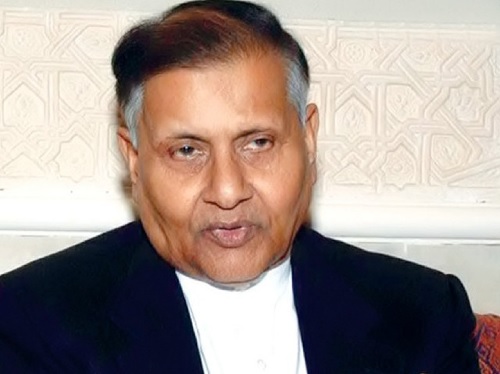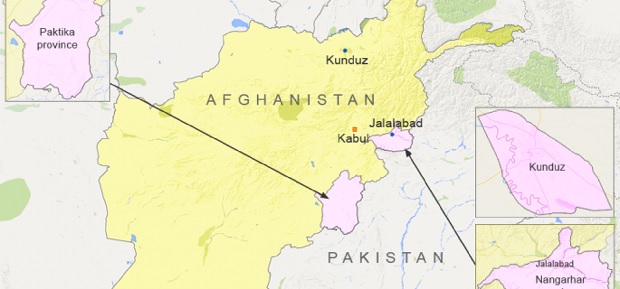By General (r) Mirza Aslam Baig
Kunduz is a turning point of the conflict between the two opposing forces; the Americans and the Taliban. The Americans having failed to achieve the objectives of war, have retreated, leaving behind a residual force of about 12000, operating from five air bases in support of Kabul regime which controls mainly the urban areas of Afghanistan, whereas the Taliban control about 80% of the rural areas, where Shariah Law prevails. Thus, it is at Kunduz, where the strategies of the opposing forces now are at real test.
American strategy has reached its logical end, as admitted by President Obama, in his speech at the United Nations: “The military power (shock and awe strategy) and money alone cannot win victories.” The Kabul regime suffers from internal dissensions and the national army is “falling like autumn leaves against Taliban onslaught.” Whereas, Taliban strategy is robust and consistent, devised by Mullah Omar, as explained to me in early March 2003, by their charismatic leader, Jalaluddin Haqqani, visiting Pakistan:
- “We have decided to fight to win our freedom. Win we will, Insha Allah. When we are free we will decide our future acceptable to all Afghans.
- “We will not allow ourselves to be betrayed by America or Pakistan after Soviet retreat in 1989-90. We will find peace with Northern Alliance for a stable Afghanistan.
- “Pakistan is a coalition partner of our enemy in this war, yet Pakistan is important because our national security interests are inter-linked and we have a common destiny.
- “We have to face a grim struggle ahead, and we will persevere because Allah has ordained: “Ultimately, your enemies will turn their back on you and run.”
Thus, for the last fifteen years, the Taliban have fought a grim battle against the mightiest of the mighty the Americans, the European Union and others. They have fought dispersed, and decentralized under respective regional commanders, operating from their distant hide-outs, yet under one central authority Mullah Omar and now Mullah Mansur. A remarkable feat of strategic resistance with support from within – the impoverished and war ravaged Afghanistan.
The Taliban have shown great deal of flexibility of maneuver, by shifting their Pivot of Resistance to the North of Afghanistan, because Pakistan military had dismantled their support base and sanctuaries in the FATA region. Their new support base now is well-established in the provinces of Badakhshan, Takhar, Faryab, Zabul, Baghlan, Jozjan, Baghdiz and Kunduz.
With every passing day, their fighting strength is increasing, as the Movement for Independence of Uzbekistan (MIU), Mujahedeen from Tajikistan, Turkmenistan and Xingjian and from within Afghanistan, the Uzbeks, Tajiks and Hazaras continue to join them. Their new support base is safe and secure, because none have the will to venture towards this base. It is not difficult to understand the operational strategy Taliban are likely to follow in the near future. They will continue to expand their control over the interior areas, thus limiting the space for maneuver to the defenders.
They will not capture towns and cities, to avoid fighting positional defense. They occupied Kunduz, because the defenders had abandoned their posts, whereas Taliban only purpose was to free their 500xprisoners, as they had done so at Kabul, a few months earlier
They have now started inter-diction of main supply routes to important cities and towns, and are trying to capture the dry port of Sher Khan, on Tajikistan border, to cut-off civil and military supplies to Afghanistan.
Similarly the road to Salang Tunnel and to Kabul is threatened to achieve isolation and containment, leading to tactical siege of cities and towns, thus forcing the defenders to seek peace or capitulation. This process is likely to continue, during the winter months and then would follow the main battle, to capture strategically important besieged cities, including a few air bases, where American troops are stationed.
After entering Kunduz, Taliban declared that they will not act Daesh. They declared forgiveness for those who had brutalized Taliban during 2001 invasion. They are not seeking revenge but reconciliation and peace with ethnic minorities in particular, with the result that the Tajik, Uzbek, Turkeman, Hazaras and the Pakhtuns who chose to be part of Afghan government in the past, now are joining Taliban in droves, causing a new upsurge of public opinion which will be detrimental to peace in Afghanistan and support to the emerging geo-strategic realities.
Taliban have captured enough weapons, ammunition and equipment at Kunduz, and more they will retrieve from 500xtruck load of such military hardware at Sher Khan dry port.
Thus, they will be able to arm and equip a reckonable fighting force, for the impending battle next year. In fact the picture that is emerging appears very similar to the happenings in Iraq that led to rise of Daesh, but the situation in Afghanistan is very much different, where Taliban have been able to maintain unity of command and control of the politically conscious leadership, seeking peace and harmony for the people of Afghanistan, who are the most tortured and brutalized people, at the hands of the civilized world, which owes a heavy debt to them, for the losses suffered by the two generations of Afghans, of death, destruction and deprivation, during the last thirty five years of war.
The sacrifices made by the Afghans through their valiant struggle, have caused a tectonic shift of the geo-strategic power spectrum of the region forming into a new reality the coalition of Russia, China, Pakistan, Iran and Afghanistan, and beckon Pakistan to change the old mindset and embrace the new reality, for a better future for Pakistan and the region._



